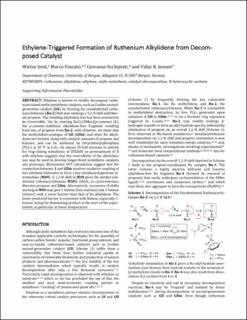| dc.contributor.author | Smit, Wietse | |
| dc.contributor.author | Foscato, Marco | |
| dc.contributor.author | Occhipinti, Giovanni | |
| dc.contributor.author | Jensen, Vidar Remi | |
| dc.date.accessioned | 2021-04-23T13:27:45Z | |
| dc.date.available | 2021-04-23T13:27:45Z | |
| dc.date.created | 2020-09-29T15:25:48Z | |
| dc.date.issued | 2020 | |
| dc.Published | ACS Catalysis. 2020, 10 6788-6797. | |
| dc.identifier.issn | 2155-5435 | |
| dc.identifier.uri | https://hdl.handle.net/11250/2739388 | |
| dc.description.abstract | Ethylene is known to readily decompose ruthenium-based olefin metathesis catalysts, such as Grubbs second-generation catalyst (GII), by forming the unsubstituted ruthenacyclobutane (Ru-2) that may undergo a 1,2-H shift and liberate propene. The resulting alkylidene loss has been assumed to be irreversible. Yet, by reacting (SIMes)(η6-p-cymene)RuCl2 (1), the p-cymene-stabilized alkylidene-free fragment resulting from loss of propene from Ru-2, with ethylene, we show that the methylidene analogue of GII (GIIm) and other Ru alkylidenes are formed, along with catalytic amounts of propene and butenes, and can be stabilized by tricyclohexylphosphine (PCy3) at 50 °C in C6D6. An almost 20-fold increase in activity for ring-closing metathesis of diethyl diallylmalonate (DEDAM) on pretreatment of 1 with ethylene suggests that the reversibility of the alkylidene loss may be used to develop longer-lived metathesis catalysts and processes. Mechanistic density functional theory (DFT) calculations suggest that the connection between 1 and GIIm involves oxidative coupling of two ethylene molecules to form a key metallacyclopentane intermediate (M49). A 1,2-H shift in M49 gives the methyl-substituted ruthenacyclobutane M303, which, on cycloreversion, liberates propene and GIIm. Alternatively, successive H-shifts starting in M49 may give 1-butene (fast reaction) and 2-butene (slower) with a lower barrier than that of Ru alkylidene. The lower predicted barrier is consistent with butene, especially 1-butene, being the dominating product at the start of the experiments, in particular at lower temperature. | en_US |
| dc.language.iso | eng | en_US |
| dc.publisher | ACS | en_US |
| dc.title | Ethylene-Triggered Formation of Ruthenium Alkylidene from Decomposed Catalyst | en_US |
| dc.type | Journal article | en_US |
| dc.type | Peer reviewed | en_US |
| dc.description.version | acceptedVersion | en_US |
| dc.rights.holder | Copyright 2020 American Chemical Society | en_US |
| cristin.ispublished | true | |
| cristin.fulltext | postprint | |
| cristin.qualitycode | 1 | |
| dc.identifier.doi | https://dx.doi.org/10.1021/acscatal.0c02206 | |
| dc.identifier.cristin | 1835045 | |
| dc.source.journal | ACS Catalysis | en_US |
| dc.source.pagenumber | 6788-6797 | en_US |
| dc.relation.project | Norges forskningsråd: 262370 | en_US |
| dc.relation.project | Notur/NorStore: NN2506K | en_US |
| dc.relation.project | Notur/NorStore: NS2506K | en_US |
| dc.relation.project | Norges forskningsråd: 226244 | en_US |
| dc.relation.project | Norges forskningsråd: 288135 | en_US |
| dc.identifier.citation | ACS Catalysis. 2020, 10, 12, 6788–6797 | en_US |
| dc.source.volume | 10 | en_US |
| dc.source.issue | 12 | en_US |
